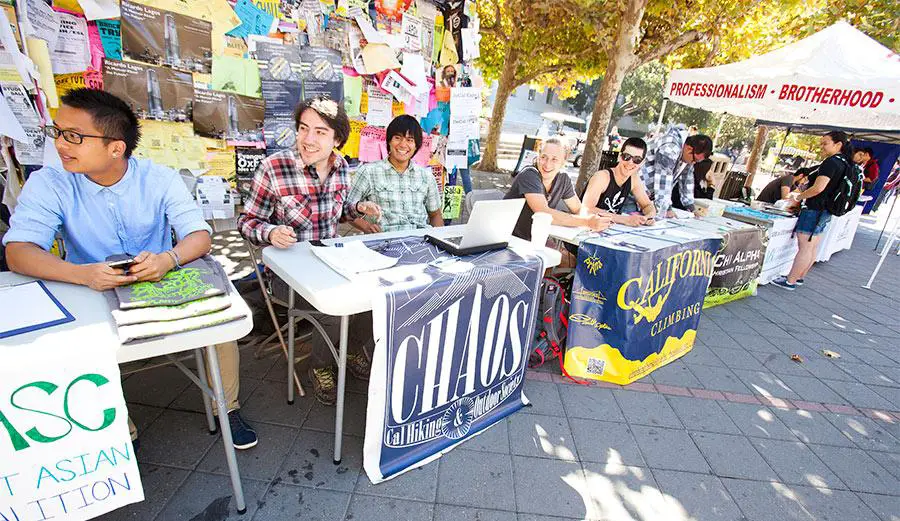How I Opened Up to the Idea of School Organizations
Why telling students to join clubs can actually be sending the wrong message.
By Maya Merberg, SUNY Geneseo
Every college student remembers being a senior in high school and the inundation of questions about their future that accompanied it.
“Where are you going to school?” “What are you going to major in?” One I found particularly bothersome was, “What organizations are you going to join?” Of course, one of the most frequently touted pieces of advice for incoming college freshman is to join things. “That’s how you’ll meet people and connect with the campus,” everyone said.
But I had never really thought of myself as, well, a joiner.

Though I was on my high school’s cross-country team, I ran only for the fun of it and wasn’t quite what one would call a team leader. The competition and rigid schedules of college athletics seemed too intense for me, and—of course knowing nothing about the reality of Greek life—I scoffed at the idea of rushing a sorority. I figured that my school would offer clubs I’d be more interested in, like the school newspaper or literary magazine.
Besides, I would meet people in the dorms and in classes. So my answer to “What organizations are you going to join?” was more or less that I’d figure it out later. (“I’ll figure it out later” has been a long-standing life motto of mine, and in all honesty it hasn’t seemed to work out particularly well.)
So freshman year I joined the school newspaper. I was copyediting something like 20 student-written articles a week. Copyediting, for those not familiar with the publishing world, is editing all the most boring and tedious aspects (format, grammar, punctuation, fact-checking) of a written piece in excruciating detail.
All joining the school paper did for me was add hours onto my workload and make me wonder if Microsoft Word’s default settings were designed by a sadist. I also tried joining the pep band, because what else can ramp up a freshman’s coolness factor 100x like playing the Star Wars theme song on the clarinet at ice hockey games?
I was too half-hearted a member of these groups to really integrate myself and get to know others in them. I ended up meeting my best friends randomly, just from living in the same building. Despite ignoring what some consider the most essential piece of college advice, things worked out alright.
Sophomore year, I met someone in class who was on the club Ultimate Frisbee team and loved it.

Having already had some interest in the game, I went to a few practices. Though I’ve always been vocal about my hatred for sports and competition, Frisbee was a fun and low-key game whose players tended to be especially good-natured. I liked the team and wanted to join, but felt hypocritical abandoning my contrarian stance. Quickly it became clear that I should just join if I wanted to, so I did. Just because I had always hated something didn’t mean I had to hate it now. Frisbee offered a fun break from studying every day and an easy way to exercise. It didn’t mean that I had to be best friends with everyone on the team, or even that I had to go to practice all the time if I had too much work.
At the same time, around the beginning of sophomore year, I pledged a fraternity. I started only wearing salmon colored shorts and became a beer pong master. Just kidding. I did join a coed national service fraternity, though.
I had a few friends pledge the previous semester, and I’d watched them undergo the process with pity and gentle disdain. Once they were integrated into the organization, however, I was proven wrong again. They met great new people, had an opportunity for community service and gained a fantastic resume booster.
Following some prodding from friends who turned out to know better than I did, I pledged the organization too. The setting was more professional than social, so I can’t truly speak to the Greek scene. But I was placed in a “family” and assigned a big, and the structure of the fraternity turned out to be great for forming new relationships. Like Frisbee, it wasn’t an all-encompassing commitment but it still offered a community of likeminded people.
It’s now been almost a year, and I think I’m better off for joining both organizations. I have a more positive view of collegiate sports and Greek life, and I understand the motives for joining them. I can more fully accept the differing interests of other people, and the fact that my own interests and positions will change over time.
That said, if I’d had no genuine interest in either organizations and never joined them, I think I would be ok, too.
I’m definitely glad I didn’t rush a sorority or try out for every varsity team just out of fear that my college experience would go to shit if I didn’t join something right away.
Instead of drilling into every freshman brain, “Just make you sure join something—anything!!” I think it makes more sense to urge them to go into it all open-mindedly. If an organization sounds enticing, cool, don’t let prejudices or stereotypes stop you from joining. But if nothing seems appealing, it’s fine to wait and meet people other ways. Maybe eventually you’ll come across something you like. Better yet, maybe you’ll realize you have a newfound fondness for something you never thought you would.

















Great article, thanks 🙂